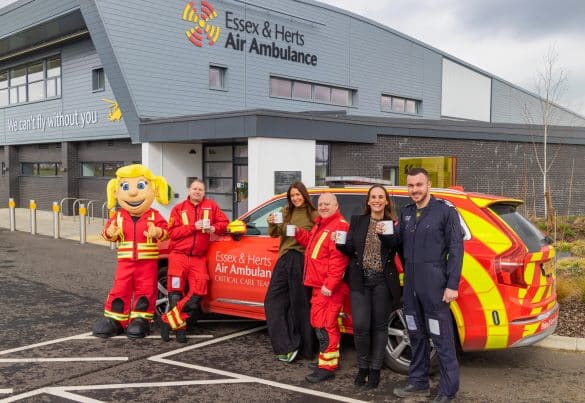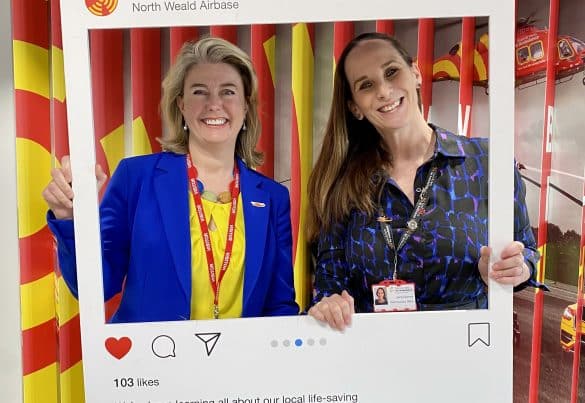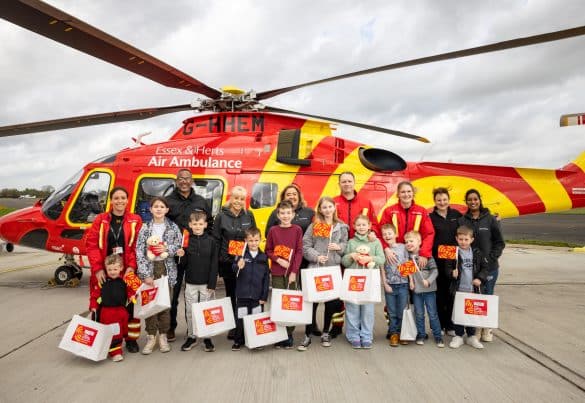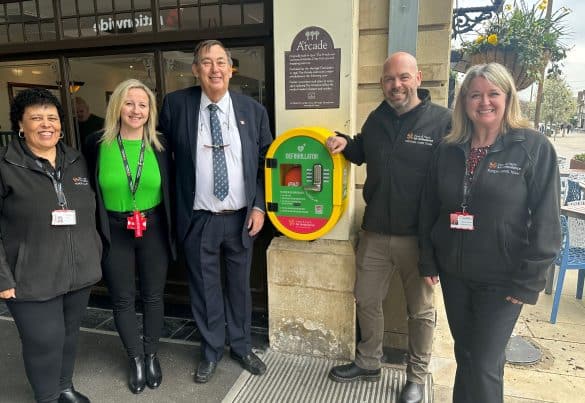SHARE
This month we caught up with Erica to talk about her experience as a member of the HEMS team at EHAAT. With International Women’s Day around the corner we took the opportunity to see what changes she would like to see in the HEMS world and what advice she would give to others in applying for a job!
What is your role at EHAAT?
I am a HEMS Critical Care Paramedic and East of England Ambulance Trust (EEAST) Air Operations Supervisor at our North Weald Airbase. My primary role is to look after our team from an EEAST perspective. Many of the Paramedics are seconded from EEAST and I provide an important link between the two services. I represent EEAST at both regional and national meetings and also support the development of critical care across the region.
Tell me about your career to date…
I started my career in 2004 at Hertfordshire University, studying FdSc Paramedic Science before progressing to a BSc (hons) Paramedic Science with Emergency Care Practice. I then gained operational experience in Essex and Suffolk before moving to the Hazardous Area Response Team (HART) and subsequently becoming a HART USAR Instructor at the International Fire Service College, Moreton-in-Marsh. I taught paramedics how to conduct medical assessment and treatment in collapsed structures, restricted and confined space and whilst working at height. This was a great faculty to be part of as it allowed me to meet and learn from paramedics from all over England and Wales. During this time I went back to the University of Hertfordshire to study an MSc Advanced Paramedic Practice (Critical Care) and continued this when I became a part of the EHAAT Team in 2012.
You don’t stop! What do you do when you aren’t at EHAAT?
I really don’t! I am also a BASICS responder for the Suffolk Accident Rescue Service. This is a team of volunteer Pre-hospital Doctors and Critical Care Paramedics that are called out to local incidents involving critically ill or injured patients who require enhanced critical care. I also teach Paramedic Science at East Anglian University and I am a British Army Reservist with 254 Medical Regiment.
In my spare time I love the outdoors – send me hiking up a mountain and I’m happy! I was a medic for the Race Across America which meant providing medical cover for a 3000 mile, non-stop cycle race for the first British female and that was one of the most amazing things I’ve ever done and is probably my greatest achievement to date. I spend a lot of time travelling, I love experiencing new things and new places. I have recently come back from snowboarding in France with some of my friends from EHAAT, which was so much fun. I’m also planning to spend some time in South Africa and Canada this year too. I haven’t been to either of those places before so I’m looking forward to it!
In 2016 you won Air Ambulance Paramedic of the Year at the AAA awards. What were the achievements that you were recognised for?
I was recognised largely for pushing the boundaries on every professional front – teaching, research, trauma and emergency care, HEMS leadership and fundraising. I think that it is not only important to push yourself, but also to empower those around you to do the same whether this be students, colleagues or patients. It was wonderful to have all of my personal achievements recognised at a national level because they have all made me who I am today. From teaching at the University, fulfilling my lifetime ambition to join the air ambulance to fundraising for causes close to my heart I truly look to achieve it all to the highest standard. It was an honour to win the award and I was very grateful of the nomination from my friends, peers and managers.
Aside from the award, do you have a particularly stand out case or moment during your time at EHAAT?
For me, the stand out cases are those where we haven’t had a successful outcome, despite giving the highest possible level of care. As lead Paramedic of the Haemorrhage Control Project I often look at the trauma cases including Road Traffic Collisions. Sometimes the patient is lost on scene with family members around and this really sticks with me. Our debrief process at EHAAT allows us to pull these cases apart and it is this that provides the ability to influence change within our organisation and makes me proud to be a part of EHAAT.
This year’s theme for International Women’s Day is ‘Press for Progress’. If you could see one change in the HEMS world what would you like it to be and why?
I would like to change women’s perception in what they think they are capable of. It is quite a common perception that women can only reach the more senior roles if they are uncommitted, single, workaholics etc. and put their career before everything else but I think it is possible to achieve success in this role and still achieve success in your personal life too. Anyone with a family or interests outside of work can do this job, in fact we welcome this, and this is proved daily by some our male team members who have young families and partners who also work full time; they make it work. However, I do think women place unnecessary pressure on themselves; the pressure to be the perfect clinician, the perfect friend, the perfect mother, the perfect wife, the balance is understandably hard for those of us who want it all.
I think that females often don’t apply for a job based on not meeting the job specification whereas men will look to challenge themselves and give it a go. It’s important to know that to become a HEMS paramedic it is a competency based assessed, not gender and we try to make the process as fair and transparent as possible. However, the most recent Critical Care Paramedic recruitment process had a higher male to female ratio, approximately one woman applied for every five men who applied, and I’d love for the perception of the job to change so that this difference decreases.
Is your role seen as an overtly male role? How would you encourage more women to apply?
Within the more senior clinical roles I would say that yes, this is predominately male. What people need to realise is that it is not about being better than men, it is about being better than who you were yesterday. Hard work and becoming an expert in your field results in success, this is not down to gender. Historically the role has been associated with men with alpha personality types, but if you are willing to learn and work hard, as long as you have the ability to multi-task, to train quickly and be willing to be part of the EHAAT team you will do well. Integrity and determination are important values at EHAAT and I believe that we are very strongly led by Jane Gurney as our CEO into moving this change within the more senior roles.
In conjunction with Louise Rosson, the Earls Colne airbase Supervisor, we organised and ran the recruitment process. We were both part of the recruitment panel and everyone that made it to the interview stage should be very proud having passed all of the theory and practical exams beforehand. From the 118 that applied we only had 4 posts available for EHAAT; that is pretty stiff competition. At the interview stage we are looking for a team player, someone who demonstrates good moral values and who has the capability to meet the objectives of the organisations. The calibre of applicants this year was fantastic!
Who is your biggest female role model?
Both my Nan and my Mum worked for the ambulance service so I have been highly influenced by them both. My Mum particularly impacted my decision and I learned a lot from her, gaining experience, understanding and the importance of a work-life balance. She was a strong, independent women and yet still managed to bring up well-rounded children, it can be done! Professionally I look towards Anne Weaver, Claire Park, Jane Gurney and Tracy Nicholls as inspiration. They all have their own mind, clear principles of honesty and integrity and a passion that makes them fiercely competitive in achieving their goals and so I look to them as individuals paving the way in our field.
What challenges do you face at EHAAT?
My biggest challenge is time. Time that I would like to give to other people to teach them or listen to the cases they’ve attended; time to change things that I would like to change, time to influence the Ambulance service and time to achieve that work-life balance! Spending time with friends and family is so important and I do have to remind myself to sometimes take a step back and do this, success is not success if you don’t have anyone to share it with. I have learned the hard way and have come close to burn out a few times and now make myself take proper rest days. By doing this I find that I am much better at focusing at tasks when I am at work so I really do try to encourage this with the rest of my team.
What is next for you and your career?
My passion is to influence a wider group of patients. The trauma care and training within the ambulance service is so infrequent as it is not the main focus of their daily workload. I would really like to change this so that when the team are exposed to a highly traumatic incident the level of care given can be at its best. My objective would be to improve overall patient care and empower staff, how I do that… I’m not sure yet!
Join our mailing list
Join the community and recieve all the latest news and updates straight to your inbox.






